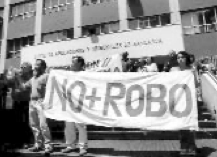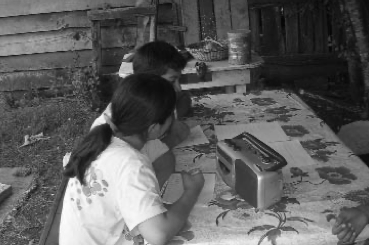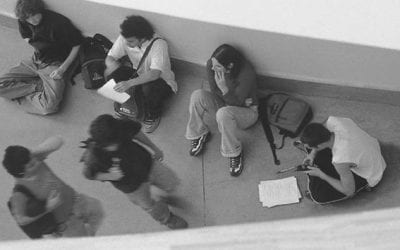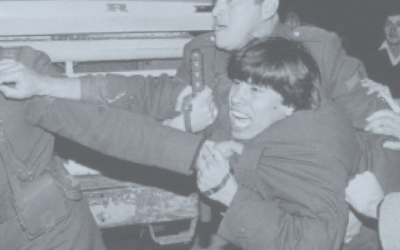Politics and Corruption
The Underside of Chilean Democracy
Since the beginning of Chilean redemocratization in 1989, numerous allegations of corruption in local government, the judiciary, ministries, public services and public enterprises have impacted public opinion. The magnitude of the phenomenon cannot be compared to that of other Latin American countries. According to Transparency International (2003) Chile is the least corrupt country in the region and the 20th least corrupt country in the world. However, the new plight has no precedent in Chilean political history.
The Chilean General Comptroller’s Office investigated 241 cases of corruption at the local level between 1993-94. Public enterprises such as Chile’s huge Copper Corporation, Concún Oil Refinery, a water and sewage plant in Valparaiso, the Maritime Corporation and the Port Authority have been accused of corruption. Services such as the National Housing Service, the Sports and Recreation Department, the National Emergency Office in the Ministry of Interior, the Military Hospital, the National Police Retirement Service, and the Office for the Return of Political Exiles also faced accusations of corruption. Moreover, in a couple of isolated scandals, members of the congressional staff were prosecuted for drug consumption and one member of the judiciary appeared to be involved in drug trafficking. Finally, the accusation that an informal political network functioned by the mid-1990s in Valparaiso, the seat of National Congress, led to the revelation of links among regional public enterprises, private contractors, regional authorities, mayors and members of congress to divert public funds into the 1997 congressional election.

Santiago residents protest corruption.
An April 1994 poll conducted by the Centro de Estudios de la Realidad Contemporánea (CERC) revealed that 57 percent of the sample considered corruption a malaise affecting both the public and private sectors. Corruption was considered a serious/very serious problem by 83 percent of the sample; 80 percent of those interviewed thought politicians took people into account only for elections.
Events moved President Eduardo Frei to create a National Commission on Public Ethics in 1994, four years after the re-inauguration of democracy. The initiative counted with the support of all political parties. Simultaneously, several ad-hoc commissions in the Chamber of Deputies investigated charges of corruption that acquired the tone of national scandals. However, the performance of these commissions was subject to partisan control and their recommendations and sanctions never affected senior political appointees involved in the misdemeanors. Only minor and token administrative measures were taken by the government, in spite of recommendations by the General Comptroller’s Office,
The political debate surrounding the scandals led to the creation of a Commission on Ethics in the Chamber of Deputies, as well as similar commissions within political parties. Congress enacted an anticorruption legislative package to insure transparency in public bureaucracy by the end of 1999. However, very few of the proposals had been implemented by the end of the Frei government, just at the time when several public executives collected huge retirement benefits, causing public outrage.
Four scandals shocked Chilean public opinion in the first half of the third government of the Concertación led by President Ricardo Lagos. In the first case, a former Minister of Public Works was accused of diverting large amounts of public funds to a private contractor to increase the salary of high-ranking officers within the ministry. The consulting firm, GATE, owned by a former regional authority of the same ministry and belonging to the minister’s political party was charged with adjudicating concessions to private constructing firms all over Chile. In a related case, the same minister was indicted, temporarily jailed and is currently being sued for asking two construction firms to pay large sums of money through the same private contractor for non-existent consultancies. The money went to apparently finance the 1999-2000 presidential campaign of candidate Lagos, a former Minister of Public Works himself. The Construction Chamber acknowledged the misbehavior of its associates promising to enforce ethical standards.
In a second case, all members of the cabinet acknowledged receiving extra money in cash as a supplement to their monthly official salaries. Funds came right out of the reserved funds of the Office of the Presidency which are not subject to scrutiny, either by congress or the prestigious Office of the General Comptroller, an independent agency created in 1926. Though salaries of cabinet members are well known to be low, the irregularity of the procedure was strongly questioned.
A third case involved a highly placed officer in the National Development Corporation (CORFO), who illegally transferred governmental titles and bonds to a private investment corporation, INVERLINK. One former Lagos government minister was closely associated with the firm, and helped capturing short-term investment from governmental institutions, private health corporations and pensions funds. Much of INVERLINK’s financial success stemmed from the firm’s privileged access to crucial information from the personal secretary of the Central Bank president, who resigned after the scandal. The scandal—more than a corruption case per se—is an example of white-collar crime. However, it illustrates how sinuous the relationship between corruption and white-collar crime can be.
Finally, six deputies belonging to parties of the governmental coalition were stripped of their immunity by the judiciary and await final verdict on a trial for bribery accusations after an investigation conducted by two Supreme Court-appointed special prosecutors. The scandal demolished one of the most precious assets that made the Chilean political class very proud of—congressional ethics and probity. The scandal added to an already protracted crisis of participation a further element of erosion of legitimacy for the Chilean political class. Most importantly, it unveiled a new and dark side of Chilean politics, corrupt representation, raising the classical concern of who guards the guardians.
A December 2002 poll conducted by Center for Public Studies (CED) showed that 57 percent of a national sample of Chileans considered that many/almost all public servants were corrupt and involved in bribes. Seventy-five percent agreed that corruption was caused by the handing out of bureaucratic positions through partisan connections, in other words political patronage, and not through a competitive merit system. Forty percent considered political parties as the most corrupt institution in the country and 67 percent across the left-center-right of the political spectrum agreed that political parties financed campaigns through illegal and illegitimate means. The last figure confirms another well-known fact about Chilean politics, that political and campaign financing has been until very recently a non-regulated activity and a virtual “black box” conducive to corruption.
A working hypothesis suggests that corruption in Chile is the outcome of two interrelated processes. First, corruption is caused by traditional clientelistic structures—historically linking the Chilean political elite and the electorate—that endured beyond the authoritarian experience, but are currently in crisis. Second, privatizations introduced deep changes in the dependent nature of political parties from the entrepreneurial state and dismantled former clientelistic mechanisms. A reduced and much less powerful State left political parties without the lubrication necessary to maintain the previous clientelistic machinery. The successful introduction of market economics made the Chilean political elite more dependent on the market and on a new and empowered entrepreneurial class.
At the same time, political parties also experienced deep transformations. Traditional parties, including those with class-based orientations, moved into the direction of business parties with political leaders and representatives performing the role of “political entrepreneurs.” Moreover, the media, especially television, made politics and electoral campaigns in Chile more burdensome by creating greater need for financial resources. Current changes in the nature and structure of Chilean political parties have made party and intra-party competition a personal contest, weakening party discipline, encouraging factionalism and giving rise to political entrepreneurship.
What is interesting is that the 2002 Latinobarómetro showed that only 13 percent of Chileans manifested that they or somebody in their immediate families had a direct experience with corruption. This means that most Chileans have clean access to basic public services such as health, education, police, tax revenue and utilities, which figured in Transparency International Global Corruption Barometer (July 2003), as corrupt in many of the 44 countries covered in the survey. The data plus the cases of corruption analyzed point to the fact that corruption in democratic Chile is limited to a small elite and displays the characteristics of “grand-corruption.”
Following Frei’s initiative, in January 2003, Lagos created a Transparency and Probity multiparty commission, charged with proposing a major governmental overhaul to fight corruption. Proposals included designing a new civil service, streamlining the bureaucracy, diminishing the number of political appointees, establishing new recruitment patterns and a merit system in the public service, reducing the amount of discretionary funds managed by the Office of the Presidency, and creating public subsidies to finance electoral campaigns. The initiative, most of whose components became law by mid-2003, is a second wave of required reforms complementing the successful implementation of market economics in the 80s.
How well will they work to control incipient corruption is something that will need to be monitored in the near future. Whether public subsidies to finance electoral campaigns will contribute to control corruption or not is to be seen, but comparative analysis suggests that perspectives should not be very encouraging:
Corruption and party finance are inextricably linked. It is obvious that whatever the origins, structure, character and ideology of a political party and irrespective of the prevailing party system, political parties solicit funds over and above those received from their members or, where available, from state subsidies. (Robert Williams, “Aspects of Party Finance and Political Corruption,” in Robert Williams (ed.), Party Finance and Political Corruption, Macmillan, London, 2000), p. 8.)
However, the emergence of ethical concerns in Chilean public opinion together with a free press and the new activism displayed by the judiciary and civil society are positive trends that will help controlling corruption.
Spring 2004, Volume III, Number 3
Alfredo Rehren is an Associate Professor at the Instituto de Ciencia Política, Universidad Catolica de Chile. He was a Luksic Visiting Scholar at the David Rockefeller Center for Latin American Studies, Fall 2003
Related Articles
Thinking on Children: A Literary Look at Childhood
When William Wordsworth formulated this reversal of parenting, putting children first and parents later, he followed through on a romantic inspiration about innocence being close to…
Salamanca of the Southern Cone
A few decades ago, Chile was commonly perceived as a long, earthquake-prone country in South America with a tough human rights record that made even intrepid travelers wary. Today…
The Other 9/11
Like a bolt of lightning that illuminates a darkened landscape, attracting everyone’s attention, the recent commemoration of the 30th anniversary of the military coup of 9-11-1973 has…




